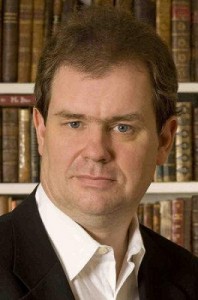 In my wanderings around the internet, I recently stumbled across this great little interview with Simon Tolkien on the Mythopoeic Society website.
In my wanderings around the internet, I recently stumbled across this great little interview with Simon Tolkien on the Mythopoeic Society website.
Simon is, of course, the son of Christopher Tolkien and the grandson of J.R.R. Tolkien, and a published author in his own right. He has written four novels. The most recent, Orders from Berlin was published in November 2012.
In the interview, which originally appeared in the Society’s journal Mythprint in June 2010, Simon speaks of his memories of his grandparents, his own writing process and his father’s work compiling The Silmarillion. Enjoy!
An interview with Simon Tolkien
Jason Fisher: Can you tell us what you remember of your grandfather, J.R.R. Tolkien, and grandmother, Edith? (Apologies for giving you the same question you’ve no doubt answered a hundred times; thank you for indulging me!)
Simon Tolkien: Yes, I have answered this question many times so let me treat it as if you are asking me about my grandparents together – a question I have never answered. They were very different people, and there were barriers between them throughout their marriage. My grandmother was not in any way intellectual. In the early years of their marriage in Leeds she transcribed some of my grandfather’s early stories, but Oxford was always hard for her – the university was an entirely male-dominated world. As a girl she had been a very good pianist but she did not pursue this once she was married. Religion also separated them. My grandfather persuaded my grandmother to convert to Roman Catholicism when they were married but within a few years she had turned her back on the Church. This must have been hard for him given the Church’s teaching that only true believers went to heaven. Their lives were never easy. My grandfather had to work very hard, combining two jobs as an author and a university professor. They brought up four children, and they lived through two World Wars.
My grandfather fought on the Somme in 1916 and two of their sons fought in the Second World War, with my uncle Michael being permanently scarred by his terrible experiences under fire. They always remained deeply loyal and proud of each other. I think that my grandfather agreed to leave Oxford for Bournemouth after he retired because he knew his wife would be happier there and it was also ‘her turn.’
I think they always retained a heartfelt tenderness for each other, remembering that they had both been orphans and the struggle that they had had to overcome to get married after my grandfather’s guardian had forced them apart for years before my grandfather came of age. Their old friend, Rob Murray told me several years ago how he had come upon them unawares when he was staying with them in Bournemouth at the end of the sixties and they were sitting hand in hand remembering how happy they had been. My grandfather was a romantic and his wife was always in part Lúthien Tinúviel dancing in the woods in 1917, and so their names appear as Beren and Lúthien on their gravestones in Wolvercote Cemetery where they are buried side by side.
F: When did you first read The Lord of the Rings? What do you think of it?
ST: I have read it five times, first when I was a child and now again to my daughter – we are about to climb the stairs of Cirith Ungol. This is the first time I have read the book since I myself became a writer, and reading it gives me a sense of who my grandfather was. I have been particularly struck by the extraordinary detail of his description of landscape. It reminds me of Thomas Hardy at his best, and I sense how much the natural world must have meant to him. Perhaps this is where his love of words began – from when his mother taught him the names of the trees and flowers in the countryside around Sarehole when he was a child. Also this time round I was deeply moved by Tom Bombadil and Goldberry – I think this was as close as my grandfather could come to describing an earthly heaven – language become poetry and song in the valley of the Withywindle.


